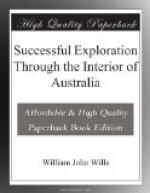chief endowments from Gifford, the satiric poet, and
Dr. Ireland, the late Dean of Westminster. I
remember how I returned in gloomy spirits after leaving
him there. As I had four other children, it may
be said that I showed undue partiality for this one,
but my conscience clears me from the charge.
I deeply felt the loss of his companionship.
He was so suggestive that he set me thinking; and
whilst I was endeavouring to teach, I acquired more
knowledge than I imparted. There was nothing
remarkable in his progress at school. I experienced
no disappointment because he did not return home at
the end of every half-year with the head prize.
He merely brought his six months’ bill, and
a letter commending his steady diligence and uniform
propriety of conduct. In viva voce examinations
he had scarcely an equal chance with one of inferior
intellect who might be quicker in expression; for
besides the trifling hesitation of speech I have already
noticed, he would have been ashamed to give a wrong
answer from eagerness. A remark of Mr. Page, his
tutor, confirmed me in my own previous impression
on this point. “It vexes me,” he
said, “that John does not take a top prize, for
I see by his countenance that he understands as much,
if not more, than any boy in my school; yet from want
of readiness in answering he allows very inferior
lads to win the tickets from him.” On the
whole, I think he derived much benefit from Ashburton;
for besides his scholastic improvement he became an
adept at the usual games, and a social favourite out
of school hours.
At the age of sixteen he left the grammar-school,
and I find the 30th of May, 1850, to be the date of
his articles to me as surgeon. I had at that
time taken a partner, Henry Manly, Esquire, now resident
at Ipplepen, with a view of introducing and resigning
to him my Ipplepen practice. Being in a country
place, five miles from Totnes, where there was no
chemist or dispensary, my son readily acquired his
duties, which were to distribute the medicines and
appliances directed for our patients by my partner
and myself. In all cases his caution was extreme
and we had no fear of his making mistakes. The
ordinary operations of extracting a tooth or breathing
a vein when a bumpkin presented himself as a patient,
he speedily mastered. The absurd practice of
going to be bled on any occasion that might strike
the fancy of the party, without the advice of the
doctor, was not at that time so completely obsolete
as in this advanced age I hope it is, and ought to
be. I remember, during the time of my own articles,
that I frequently performed venesection five or six
times in a day on persons who requested and fancied
they required it; and I seldom indulged in the liberty
of asking, wherefore.




